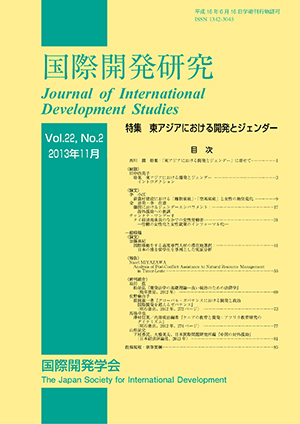Volume 22, Issue 2
Displaying 1-11 of 11 articles from this issue
- |<
- <
- 1
- >
- >|
Special Issue : Development and Gender Issues in East Asia
-
2013Volume 22Issue 2 Pages 1-2
Published: November 15, 2013
Released on J-STAGE: September 27, 2019
Download PDF (690K)
Review
-
2013Volume 22Issue 2 Pages 3-7
Published: November 15, 2013
Released on J-STAGE: September 27, 2019
Download PDF (772K)
Articles
-
2013Volume 22Issue 2 Pages 9-15
Published: November 15, 2013
Released on J-STAGE: September 27, 2019
Download PDF (526K) -
2013Volume 22Issue 2 Pages 17-30
Published: November 15, 2013
Released on J-STAGE: September 27, 2019
Download PDF (778K) -
2013Volume 22Issue 2 Pages 31-40
Published: November 15, 2013
Released on J-STAGE: September 27, 2019
Download PDF (930K)
Articles
-
2013Volume 22Issue 2 Pages 41-54
Published: November 15, 2013
Released on J-STAGE: September 27, 2019
Download PDF (2296K)
Report
-
2013Volume 22Issue 2 Pages 55-67
Published: November 15, 2013
Released on J-STAGE: September 27, 2019
Download PDF (1388K)
New Publications
-
2013Volume 22Issue 2 Pages 69-71
Published: November 15, 2013
Released on J-STAGE: February 10, 2024
Download PDF (1091K) -
2013Volume 22Issue 2 Pages 73-75
Published: November 15, 2013
Released on J-STAGE: February 10, 2024
Download PDF (1036K) -
2013Volume 22Issue 2 Pages 77-79
Published: November 15, 2013
Released on J-STAGE: February 10, 2024
Download PDF (1034K) -
2013Volume 22Issue 2 Pages 81-84
Published: November 15, 2013
Released on J-STAGE: February 10, 2024
Download PDF (1096K)
- |<
- <
- 1
- >
- >|
